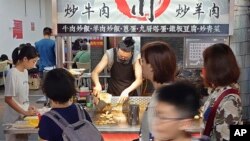In the run-up to Taiwan’s highly competitive presidential and legislative elections in January 2024, China is exploiting doubts voters may have about the United States and its intentions toward Taiwan, according to political experts in the self-governing island that Beijing considers its territory.
A report by the Information Operations Research Group, or IORG, that was updated Sunday found 84 examples of China promoting suspicion of the U.S. and its intentions in Taiwan over the past three years.
The group believes the Chinese government and its state media are promoting the ideas, such as the U.S. is a fake friend to Taiwan, Washington will abandon Taiwan, and the elite of the two nations are colluding to exploit Taiwan.
The IORG report, published Aug. 8, also says that China’s narrative positions Beijing as the keeper of world order in the face of chaos sown by the U.S. The group is a civil society organization that, according to its website, "uses science and education to reduce information manipulation, advance understanding of the Mandarin information environment, facilitate reasonable public discourse, and strengthen Taiwan’s democratic resilience."
The Jan. 13 vote comes as tensions escalate between the island of 24 million people and its neighboring superpower, China. Taiwan said that this month it has observed dozens of fighters, drones, bombers and other aircraft, as well as warships and the Chinese aircraft carrier Shandong, operating nearby, according to Reuters.
Zhu Fenglian, the spokeswoman of China's Taiwan Affairs Office, acknowledged the drills by the People's Liberation Army, saying at a regular briefing in Beijing on Wednesday, "The purpose is to resolutely combat the arrogance of Taiwan independence separatist forces and their actions to seek independence."
Some in Taiwan have told VOA that these recent military incursions have increased their negative perception of the Chinese government.
And U.S. President Joe Biden made clear last year that he would be willing to intervene to defend Taiwan if China were to invade.
Chihhao Yu, co-director of the IORG, said in a seminar on Sept. 21, "We believe that the suspicion theories echo the Chinese Communist Party’s [CCP’s] other propaganda, and the combination of the two creates a world view for Chinese-speaking audiences that is in line with China's interests. For example, that the United States is a fake friend and will abandon Taiwan. Other CCP propaganda is meant to promote the good side of China. For example, that China is Taiwan's family and relative."
Jaw-Nian Huang, assistant professor at the Graduate Institute of Development Studies at National Chengchi University, said the narratives against the U.S. often promote the perception that "the U.S. is an evil imperialist hegemony," in contrast with the illusion of China being "peaceful and non-hegemonic."
Huang told VOA Mandarin, "The goal is to create opposition against the U.S. and to gain an advantage over the U.S. in the battlefield of Taiwan’s public opinion."
Huang said that suspicion of the U.S. and trust in the U.S. coexist for many people in Taiwan, and the CCP may manipulate that contradiction to influence their votes.
He said that voters in Taiwan who support the ruling Democratic Progressive Party tend to believe that the U.S. will send troops to help defend Taiwan and oppose the statement that deepening U.S.-Taiwan relations is dangerous to Taiwan.
Huang added that voters aligned with the pro-Chinese Nationalist Party hold the opposite position and are softer on China. So, in theory, Huang said if China’s manipulations can move voters into the pro-Beijing CNP camp, prospects for the DPP will dim.
Analysts say that promoting suspicion of the U.S. is part of China's cognitive warfare in Taiwan. People in Taiwan are aware of how Beijing has quashed democracy in Hong Kong under the "one country, two systems" that is has promoted for the island, and even President Tsai Ing-wen has rejected it.
Kuan-chen Lee, assistant research fellow in the Division of Chinese Politics, Military and Warfighting Concepts at the Institute for National Defense and Security Research, said that "peaceful reunification" is one of China's strategies with its cognitive warfare.
China has promoted the notions that "unification is beneficial," "Taiwan's independence is a dead end," and "outsiders are unreliable." Creating suspicion of outsiders is designed to make people in Taiwan reject support from the U.S. and other international allies, according to Lee.
He told VOA Mandarin, "The CCP wants to intervene in the elections, so they will use this opportunity to hype up the concept of war [forceful reunification] and peace [peaceful resolution]. In fact, the CCP has been using this binary concept to confuse the Taiwanese people: ‘If you are afraid of war, then accept the peace [by surrender] that is humiliating to you.’"
But mainstream public opinion in Taiwan isn’t accepting the anti-U.S. messaging from Beijing.
A Taiwan National Defense and Security poll released in August by the Institute for National Defense and Security Research found that about 57% of the respondents don't think U.S. military aid would push Taiwan into war.





